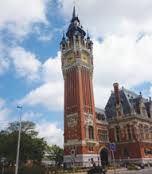More in the August print issue of Professional Security, in Jim Gannon’s monthly column. The Home Secretary Theresa May has announced a new ‘secure zone’ at the port of Calais for UK-bound lorries.
In a written statement she told the House of Commons on July 14: “This will provide a secure waiting area for 230 vehicles – the equivalent of removing a two-and-a-half mile queue from the approaching road. This should transform protection for lorries and their drivers – removing them from the open road where they can become targets for migrants attempting to board their vehicles.”
Since November £6m has been spent on reinforcing security ‘at our juxtaposed ports in Northern France’; such as new fencing to secure the approaches to the port of Calais; an upgrade of detection technology and more dog searching.
She stressed that Calais was ‘clearly symptomatic of a wider issue that needs to be tackled at source and in transit countries. This was reflected in the recent European Council discussions which my Rt Hon Friend the Prime Minister attended and reported to this House. The Government is clear that we must break the link between people making the treacherous journey across the Mediterranean and achieving settlement in Europe. And we must target and disrupt the organised criminal gangs who profit from their fellow humans’ misery, selling them false promises before loading them onto dangerous vessels and sending them – in many cases – to their deaths.’
As for the Government’s wider work, she said that since 2010 it has revoked the driving licences of 11,000 illegal immigrants, and closed nearly 900 bogus colleges.
For Mrs May’s statement in full click here.
The trade body the Freight Transport Association welcomed the announcement to protect drivers from what it called the gangs of migrants who have been threatening UK drivers. FTA Deputy Chief Executive James Hookham reported to the Home Affairs Committee on the experiences of association members who had he said encountered intimidation, threats of violence, damage to vehicles and spoiled cargoes while waiting at the port to cross the Channel.
He said: “At long last something is being done in order to protect drivers, but we still need the French to step up their policing of the area and address the issue of the migrants camped out in Calais.”
A strike by ferry workers brought the port to a standstill, with thousands of trucks queuing among migrants who tried to access vehicles. Stowaways were removed from lorries by Border Force staff when services resumed on the ferries and Eurotunnel. One died when he tried to board a moving train inside the tunnel, and more were injured by a train.
Hookham said: “Calais is a vital trade gateway, with £89 billion passing through the port every year. We cannot allow the migrants to put this in jeopardy – already millions of pounds have been lost in delays, damage to vehicles and spoiled cargoes.”
For the July 14 evidence given to the committee, also by Alan Pughsley, Chief Constable, Kent Police; Richard Burnett, Chief Executive, Road Haulage Association, John Keefe, Director of Public Affairs, Eurotunnel; and James Brokenshire, Minister for Immigration, click here.
Keith Vaz, Labour MP and newly re-elected chair of the Home Affairs Committee, spoke of concern that there is a sense that Calais is spiralling out of control. “The Deputy Mayor of Calais told me last week that the situation in Calais is like a “civil war”. The security measures at both the ferry and tunnel ports appear to be creaking under the strain of the enormous increase in migrants who have flooded the town in search of a better life in the UK. Fences are not enough. The number of people who have crossed the border illegally to reach Dover via Calais has trebled in the past year and many lives have been lost in the process, including the two tragic cases we have seen in recent weeks.
“We are keen to speak to the local authorities to see whether they have the necessary resources, support and skills to hand to perform the role demanded of them as a major port of entry through Europe and to the UK, as well as the transport operators. It is also important that the committee hear from those who are tackling the situation on British soil, namely in Kent. The committee hopes to hear concrete proposals from the UK Minister for Immigration on the situation in Calais to ensure that security is further strengthened and fewer lives are lost.”
Pictured: Calais town hall.
What is Operation Stack?
Operation Stack is where parts of the M20 are used to queue lorries travelling towards the Continent, to avoid causing gridlock across Kent’s road network.
Kent Police say that it is only introduced as an emergency measure after consultation with other agencies and implemented following a thorough assessment of issues, including safety concerns and disruption on the road network. Freight within Operation Stack is separated into two queues on either side of the carriageway, one for tunnel traffic and one for port traffic.
Space is left in the middle of the motorway to allow for emergency vehicles e.g. freight breaking down, medical emergencies. Queues are released each time a ferry or train is due to depart to ensure the most amount of freight can continue to their destination in Europe.









